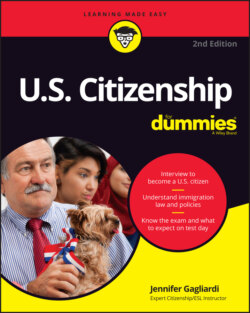Читать книгу U.S. Citizenship For Dummies - Jennifer Gagliardi - Страница 80
Second preference: Professionals
ОглавлениеProfessionals holding advanced degrees, or persons of exceptional ability in the arts, sciences, or business, receive 28.6 percent of the yearly visa allotment, plus any leftover first preference employment visas. In most second preference category cases, you must have a firm offer of employment and your U.S. employer must file a USCIS petition on your behalf. In most cases, an employer must also obtain labor certification from the Department of Labor (DOL) before filing the petition.
The labor certification is the DOL’s way of officially letting the USCIS or State Department know that there are no qualified U.S. workers who are willing and able to take the position. Working in conjunction with State Workforce Agencies (SWAs), the Department of Labor, through its Employment and Training Administration (ETA) reviews the proposed employment for compliance with U.S. wage and occupational practices and may guide the actual hiring process. The government wants to be sure that employing an immigrant under the terms described in the application will not adversely affect wages and working conditions of similarly situated U.S. workers.
For more information about labor certifications or for an online application, visit the DOL website at www.ows.doleta.gov/foreign.
Even if the DOL issues a labor certification, this does not guarantee you a visa. Whether you get a visa is ultimately up to the USCIS or State Department and also depends on visa availability.
Because of labor certification backlogs, the standard procedure can take years. Measures to expedite the process, and a new process to be implemented after this book is published, promise to improve the situation in the future. This is a complicated area of immigration law that requires familiarity with how different positions are defined, their standard requirements and wages, and how to approach both DOL and USCIS processing. Your sponsoring employer should work with a qualified immigration attorney or legal organization (see Chapter 7 for more information about finding reliable help).
Members of the professions holding advanced degrees (professors and researchers) must be internationally recognized in their particular area and meet other requirements, including having earned a master’s degree or a bachelor’s degree with at least five years of post-baccalaureate, progressive experience in the specialty (such as advancing levels of responsibility and knowledge).
Regulations vaguely define exceptional ability as “having a degree of expertise significantly above that ordinarily encountered in the sciences, arts, or business.” In order to document your qualifications as an alien of exceptional ability, be prepared to show at least three of the following:
An official academic record showing you have a degree, diploma, certificate, or similar award from a college, university, school, or other institution of learning relating to your area of exceptional ability
Letters documenting at least ten years of full-time experience in your chosen occupation
A license to practice the profession or certification for a particular profession or occupation
Evidence you have commanded a salary that demonstrates exceptional ability
Membership in professional associations
Recognition by peers, government entities, or professional or business organizations for your achievements and significant contributions to your field
Your employer may not need a labor certification before petitioning under the second preference category if one of the following is true:
Exemption from labor certification would be in the United States’ national interest.
You qualify for one of the shortage occupations in the Labor Market Information Pilot Program, which defines up to ten occupational classifications in which there are labor shortages. For aliens within a listed shortage occupation, a labor certification will be deemed to have been issued for purposes of an employment-based immigrant petition.
You are employed in an occupation designated as Schedule A. In these cases, the Department of Labor delegates authority to approve labor certifications to the USCIS. Schedule A, Group I includes physical therapists and professional nurses. Schedule A, Group II includes aliens of exceptional ability in the sciences and arts (except the performing arts).
